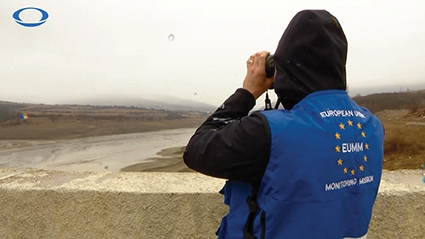On Patrol with the EUMM
As we dutifully reported in our paper’s last politics issue, GEORGIA TODAY and Panorama Talk show teamed up to join the European Union Monitoring Mission’s (Mtskheta Field Office) patrol on New Year’s Eve. Here are the takeaways from that journey, as told us by the members of the EUMM patrol and inhabitants of the village that we visited, Petriani.
Petriani and its inhabitants
The so-called ABL is invisible here – as in, there is no sign of the menacing barbed wire that has been synonymous with the “creeping occupation”. The roads are terrible (that one is hardly Russia’s fault though), people get kidnapped, and the ABL cuts through the village cemetery. People, while thankful to the EUMM for all they do, are hardly of the optimistic view. Our usual questioning commences and, once again, we discover that the meaning of monitoring mission, try as hard as they might, is sometimes hard to grasp for the local population. Take this man, for example.
Zaur Jiquri, a resident of the village of Petriani, told us: “Our everyday life is not as it used to be. Everyone had a job back then. Now, hardly anybody does. People need to eat, clothes to wear. If they don’t work, how will they do it? We hardly get enough pension for daily sustenance.”
We asked what he and the villagers thought of the EUMM presence. “They come and go. They ask us some questions. How can they help us? They don’t have resources for that. On the upper side of the village there are Russians stationed about 200-300 meters in. If you go to the upper side of the village, they will take you.”
Tea Saltkhutsishvili though, also from Petriani, is of a different mind. “We thank the EUMM. They help us in every possible way. We’re very grateful. It’s hard for us - we can’t go to the cemetery. My husband was detained three years ago, my son-in-law was detained there, too. Because of this we cannot bury our dead there. My father-in-law is buried there but we couldn’t bury our grandma because it was impossible to get in.”
The Monitors
Well, it isn’t easy to be one. Aside from being far from home and such sentiments aside, it requires rigorous preparation and training, just as Codrut Pandelea, an EUMM monitor from Romania, eagerly attests when asked what it means to be a Monitor in the EUMM and the difficulties faced.
“If I were to describe the EU Monitoring Mission monitors, I would say that we are professionals coming from different European countries, dedicating our knowledge and experience to actively sustaining the implementation of the Mission's mandate. Of course, it is a difficult job; we face a lot of challenges, from road and weather conditions, to working away from our families. Nevertheless, we are prepared for these challenges and we are very well trained for any situation. For example, although I have a police background and I was trained in my home country, I received additional training when I was deployed in the Mission. In addition, I can say that the training received here was very complex, ranging from driving 4x4 vehicles, to orientating in the field using maps, GPS and other sophisticated devices.”
Some of a more old-fashioned mind might say ‘it’s a man’s job,’ but they couldn’t be more wrong, as Dora Alves from Portugal tells us, beaming with pride, that’s she was one of the members of the 60,000th EUMM Patrol.
“Of course, all of us would like to be with our families, especially at this time of year. However, it’s not my first time spending the holidays away. The important thing is that they fully support me, and I feel that they are always with me. I feel them in my heart. I actually consider it a privilege to be working in such a beautiful place.”
We asked her if she had any particular memories while she was on patrol with her EUMM colleagues.
“They’re like a family to me. When we’re on patrol, I know I can rely on them and they on me. There is a strong sense of trust and support between us. I had the pleasure of being part of the 60,000th patrol of the EU Monitoring Mission. It was in October 2017, nine years after the first monitors went on patrol in this same area. It was a milestone for the Mission and an honor for me to be part of it.”
Codrut then told us about people’s reactions when they see the EUMM presence.
“People always greet us with a smile. I was pleasantly surprised to see how open and friendly the people here are, always waving at us. They see us monitoring the situation along the Administrative Boundary Line and ask us where we come from, and if we like Georgia. We have different professional and cultural backgrounds, and the people we meet are always interested in hearing about our home countries.”
Georgians at the EUMM
144 of the EUMM staff are Georgian and there’s hardly a more difficult task among them than that of being a field interpreter. Nino Mkheidze has served as a communicator between locals and the EUMM foreign staff for almost ten years.
“My work as an interpreter gives me the chance to take part in the EU Monitoring Mission`s daily activities. My responsibility is to facilitate communication between Monitors and the local population in Georgia. The EU Monitoring Mission is vitally important for the local population, and they generally understand the Mission`s role in the overall security situation very well. On a personal level, communication with people on a daily basis is very emotional. Each of them has a personal story, which they share with our Monitors. From a professional perspective, I think that my work is dynamic and very interesting. I’m proud that I contribute towards the implementation of the EU Monitoring Missions’ mandate.”
Vazha Tavberidze












